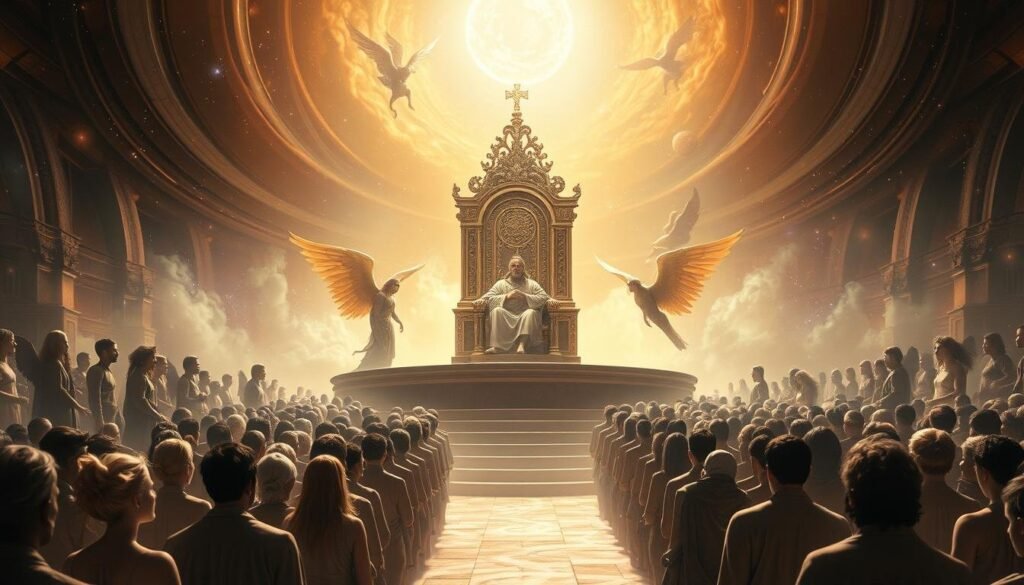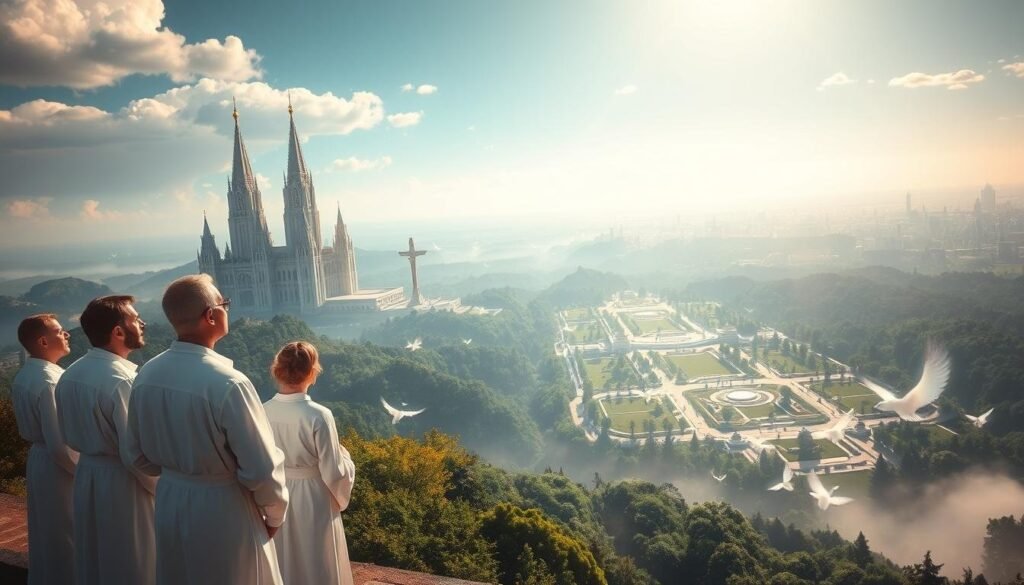Last updated on September 11th, 2025 at 01:08 pm
Are you curious about what Mormons believe happens after we die? The Latter-day Saints have a special view on the afterlife. It’s shaped by their religious teachings.
The afterlife is a key part of Mormonism. It guides how Mormons live and make choices. Knowing about these beliefs helps us understand the Mormon community’s values and practices.
Exploring Mormon afterlife beliefs shows how they shape daily life. The afterlife is more than just a theory for Mormons. It’s a vital part of their faith.
Contents
- 1 The Church of Jesus Christ of Latter-day Saints: An Overview
- 2 The Plan of Salvation: God’s Blueprint for Eternity
- 3 Pre-mortal Existence: Life Before Earth
- 4 Mortal Life: A Testing Ground
- 5 What Do Mormons Believe About the Afterlife?
- 6 The Spirit World: The Immediate Afterlife
- 7 Resurrection: Reuniting Body and Spirit
- 8 Final Judgment: Evaluation of Mortal Lives
- 9 The Three Kingdoms of Glory
- 10 Eternal Families and Exaltation
- 11 Temple Work for the Dead
- 12 Conclusion
- 13 FAQ
- 13.1 What is the Plan of Salvation in Mormonism?
- 13.2 What happens to Mormons after they die?
- 13.3 What is the significance of the resurrection in Mormonism?
- 13.4 What are the Three Kingdoms of Glory?
- 13.5 Can Mormons be with their families forever?
- 13.6 What is temple work for the dead?
- 13.7 How do Mormons view the final judgment?
- 13.8 What is exaltation in Mormonism?
- 13.9 What is pre-mortal existence?
- 13.10 How does Mormonism view mortal life?
The Church of Jesus Christ of Latter-day Saints: An Overview
The Church of Jesus Christ of Latter-day Saints was founded by Joseph Smith in 1830. It is a restorationist Christian church with unique beliefs and practices. It is often called the Mormon Church, named after the Book of Mormon.
The Church’s main beliefs focus on Jesus Christ and the restoration of his gospel. Key doctrines include:
- The importance of faith, repentance, baptism, receiving the gift of the Holy Ghost, and enduring to the end.
- The belief in modern prophets and apostles who guide the Church.
- The practice of temple worship, which includes ordinances for the living and the dead.
Understanding these foundational elements is crucial for grasping Mormon beliefs about the afterlife. The Church teaches that life on Earth is part of a broader plan of salvation. The afterlife is seen as a continuation of this plan. As you explore Mormon beliefs about the afterlife, you’ll see how these core doctrines play a significant role.
The Plan of Salvation: God’s Blueprint for Eternity
In Mormon theology, the Plan of Salvation is God’s blueprint for His children’s eternal journey. It outlines the steps needed to return to God’s presence and achieve eternal life.
The Plan of Salvation starts with a pre-mortal existence, where spirits live with God before Earthly birth. It aims to help individuals make the most of their life on Earth, preparing them for the afterlife.
Mormons understand the Plan of Salvation to grasp life’s purpose and the importance of their choices. It highlights the need for faith, repentance, and ordinances like baptism. These are crucial for a successful journey through mortality and into the afterlife.
The Plan of Salvation is more than a doctrine; it’s a guide for a meaningful life. It encourages making choices that align with eternal goals. This fosters a deeper connection with God and the community.
Pre-mortal Existence: Life Before Earth
Mormons believe that before we were born, we existed as spirits in a realm before Earth. This idea is key to their belief in the Plan of Salvation. They think that in this pre-mortal life, spirits lived with God, waiting to be born on Earth.
The idea of pre-mortal existence deeply affects how Mormons see life’s purpose and what comes after. It means that life on Earth is a test and a chance to grow. This prepares us for what’s next.
Mormon teachings say that in the pre-mortal world, we were part of a heavenly family. This family had a Heavenly Father and a Heavenly Mother. This idea shapes their views on family and eternal bonds.
Knowing about pre-mortal existence helps Mormons understand God, life’s purpose, and the chance for eternal life with family.
Mortal Life: A Testing Ground
Mormons see mortal life as a testing ground. Here, you face challenges and make choices that shape your eternal future. You are expected to grow in faith, obedience, and character.

Your experiences, good or bad, are chances to learn and improve your values. The choices and actions you take are key to your eternal destiny. By overcoming challenges, you show your commitment to your faith and God’s commandments.
In this view, mortal life is more than just living. It’s a crucial part of your eternal journey, preparing you for what comes after death.
What Do Mormons Believe About the Afterlife?
Mormons see life on earth as just a part of a much bigger journey. This journey includes a pre-mortal existence, mortal life, and an afterlife. They believe in an eternal journey.
When someone dies, their spirit moves to a spirit world. There, they learn about Jesus Christ and can choose to accept or reject His teachings. This belief is key to Mormon beliefs about the afterlife.
Mormons believe in eternal families. They perform baptisms and sealings for their ancestors. This lets these ancestors accept or reject these ordinances in the afterlife. It’s a big part of what happens after death in Mormonism.
In the afterlife, Mormons think people will be judged on their life’s actions and intentions. Those who lived well and accepted the gospel will be resurrected. They might even reach the highest glory, living with God and Jesus. This shapes how Mormons live their lives every day.
The afterlife in Mormonism is more than just what happens right after death. It’s about eternal families and reaching the highest glory. It’s a big and complex idea.
The Spirit World: The Immediate Afterlife
In Mormon beliefs, the spirit world is key to the Plan of Salvation. It’s where spirits go after we die. You might wonder what this means for you and your loved ones. The spirit world is not just a resting place; it’s a vital step towards eternal life.
When we die, our spirit moves to the spirit world. This place has two main areas: paradise and spirit prison. Paradise is for those who lived righteously, where they find peace and joy. Spirit prison is for those who didn’t live righteously or didn’t hear the gospel, waiting to receive it.
| Realm | Description | Inhabitants |
|---|---|---|
| Paradise | A place of peace and joy | Righteous individuals |
| Spirit Prison | A place for those who were not righteous or did not hear the gospel | Those awaiting the gospel |
The spirit world is temporary. Everyone will be resurrected and get a glorified body. Knowing about the spirit world helps us understand Mormon views on the afterlife and the chances we have in this life and the next.
Resurrection: Reuniting Body and Spirit
Mormons believe the resurrection is key in the Plan of Salvation. It brings together the body and spirit forever. This belief is central to their view of the afterlife and eternal life.
The resurrection is more than just coming back to life. It’s a change where the body and spirit are joined, never to part again. This idea comes from Jesus Christ’s teachings and is seen as a core part of God’s plan for us.
In Mormon theology, the resurrection is for everyone. It doesn’t matter if you were good or bad in life. The doctrine of resurrection shows how important the body is in our journey to the afterlife.
| Aspect of Resurrection | Description |
|---|---|
| Universality | Applies to all people, regardless of moral standing or life circumstances. |
| Nature of Resurrection | Reunion of body and spirit, never to be separated again. |
| Significance | Crucial for eternal progression and exaltation. |
Learning about the resurrection in Mormonism helps us understand their faith. It shows how their beliefs on the Plan of Salvation and eternal life with God work together.
Final Judgment: Evaluation of Mortal Lives
The idea of final judgment is key in Mormon beliefs. It marks the end of one’s life on Earth. People are judged on their actions, choices, and how righteous they were during their time here.
Mormons see the final judgment as a crucial part of their salvation plan. It’s where the choices made in life have big effects for eternity. This judgment looks at the actions, but also why they were done.

| Criteria | Description | Significance |
|---|---|---|
| Adherence to Commandments | Following God’s commandments as revealed through scripture and modern prophets. | Demonstrates obedience and commitment to God’s will. |
| Moral Integrity | Living a life of honesty, integrity, and moral rectitude. | Reflects the individual’s character and commitment to ethical living. |
| Repentance and Forgiveness | Seeking forgiveness for sins committed and making amends when possible. | Shows humility and a willingness to be cleansed from sin. |
Knowing about the final judgment and its standards can inspire Mormons to live righteously. It encourages them to make choices that reflect their beliefs about eternal life.
The Three Kingdoms of Glory
Understanding the Three Kingdoms of Glory is key to knowing the Mormon view on eternal life. Mormons believe the afterlife is not just one thing. Instead, it’s a complex setup with different levels of glory. The doctrine of the Three Kingdoms of Glory is a core part of Mormon beliefs about the afterlife.
It explains the various levels of eternal glory people can reach based on their choices in life. The Three Kingdoms are the Celestial, Terrestrial, and Telestial Kingdoms. Each has its own special glory.
TheCelestial Kingdomis the top glory level. It’s for those who have made big sacrifices and commitments to their faith. This includes being sealed in a temple and living a righteous life.
TheTerrestrial Kingdomis a lower glory level. It’s for those who were honorable but not very strong in their faith. They didn’t break God’s laws or miss out on important ordinances in life.
TheTelestial Kingdomis the lowest level. Yet, it’s still better than life on earth. It’s for people who were dishonest, used magic, cheated on their spouses, or rejected Jesus’ gospel.
To get into one of these kingdoms, people must follow the rules and do the necessary ordinances. Mormons aim to reach the Celestial Kingdom. There, they can live with their families forever.
Eternal Families and Exaltation
For Mormons, believing in eternal families and exaltation is very important. They think families can be together forever, not just in life but eternally.
The idea of eternal families is based on the belief that family ties don’t end with death. Through temple ordinances, like eternal marriages, families can be sealed together. This lets them stay together forever. It shows how crucial family is in Mormon beliefs.

Exaltation is the highest glory in the afterlife. It’s where families can find eternal happiness and keep growing. They live with God the Father and Jesus Christ, and their family bonds last forever. Mormons see exaltation as the ultimate goal, the peak of their journey.
To reach exaltation, Mormons follow certain principles. They believe in faith, repentance, and obeying God’s laws. They also value temple covenants and ordinances. These are key for eternal families and exaltation.
In short, Mormon beliefs on eternal families and exaltation paint a picture of life centered on family and divine presence. This doctrine gives Mormons comfort, hope, and purpose. It guides their choices and actions in life.
Temple Work for the Dead
In the Mormon faith, doing temple work for the dead is seen as a sacred duty. It’s a labor of love. You might be curious about how it works and why it matters.
Temple work for the dead means doing vicarious ordinances for those who have passed away. These include baptism, confirmation, endowment, and sealing. These are key for the deceased to progress in the afterlife. The goal is to give them a chance to accept or reject these ordinances in the spirit world.
The temple work process is detailed and involves keeping accurate records. This ensures the right people receive the ordinances. Family history research is key. It helps find ancestors and others for whom the ordinances can be done.
| Ordinance | Purpose | Benefit to the Deceased |
|---|---|---|
| Baptism | Performed vicariously for the deceased | Allows the deceased to accept or reject the ordinance in the spirit world |
| Confirmation | Confers the gift of the Holy Ghost | Provides the deceased with the opportunity to receive guidance and comfort |
| Endowment | Provides instruction and covenants related to exaltation | Offers the deceased knowledge and covenants that can aid in their eternal progression |
| Sealing | Seals families together eternally | Allows the deceased to be part of an eternal family unit |
By doing these ordinances, Mormons believe they’re helping their ancestors and others. They’re giving them the chance for eternal life and exaltation. This shows the Mormon belief in family and the eternal bond between them.
Conclusion
You now know a lot about Mormon beliefs on the afterlife. The Church of Jesus Christ of Latter-day Saints has a clear plan for what comes after we die. This plan is called the Plan of Salvation.
This plan includes life before we were born, our time on earth, the spirit world, coming back to life, being judged, and three kingdoms of glory. Mormon teachings focus on the importance of families and the goal of becoming exalted.
They also believe in doing temple work for their ancestors. This lets people make important rituals for their family members who have passed away. Thinking about these beliefs shows how they guide Mormons’ lives and their views of eternity.
A quick summary of Mormon beliefs on the afterlife shows how much they value eternal families and the chance to become exalted. Learning about these beliefs helps you understand the values and practices of The Church of Jesus Christ of Latter-day Saints.
FAQ
What is the Plan of Salvation in Mormonism?
The Plan of Salvation is a key doctrine in Mormonism. It explains God’s plan for His children. This includes life before birth, life on earth, and what comes after.
What happens to Mormons after they die?
Mormons believe that after death, people go to the spirit world. There, they prepare for resurrection and judgment.
What is the significance of the resurrection in Mormonism?
The resurrection is very important in Mormonism. It’s when the body and spirit are joined again. This makes individuals whole and perfect.
What are the Three Kingdoms of Glory?
Mormons talk about the Three Kingdoms of Glory: celestial, terrestrial, and telestial. These are levels of glory in the afterlife. They depend on how people acted in life.
Can Mormons be with their families forever?
Yes, Mormons believe in eternal families. Through temple ordinances and exaltation, families can stay together forever.
What is temple work for the dead?
Temple work for the dead is a Mormon practice. It’s about doing ordinances for the deceased. This gives them a chance to accept or reject the gospel in the afterlife.
How do Mormons view the final judgment?
Mormons believe in a final judgment. It’s when people’s actions in life are evaluated. Their eternal fate is decided then.
What is exaltation in Mormonism?
Exaltation is the highest glory in Mormonism. It means eternal life with God and Jesus Christ forever.
What is pre-mortal existence?
Pre-mortal existence is a Mormon belief. It says people lived before birth as spirit children of God.
How does Mormonism view mortal life?
Mormons see mortal life as a chance to grow spiritually. It’s a time to make choices that affect their eternal future.

Ramona Pearson is a U.S.-based religious researcher and writer with over 10 years of experience studying Mormon history and beliefs. She is also a practicing Mormon and writes to inform readers with accuracy and balance.

